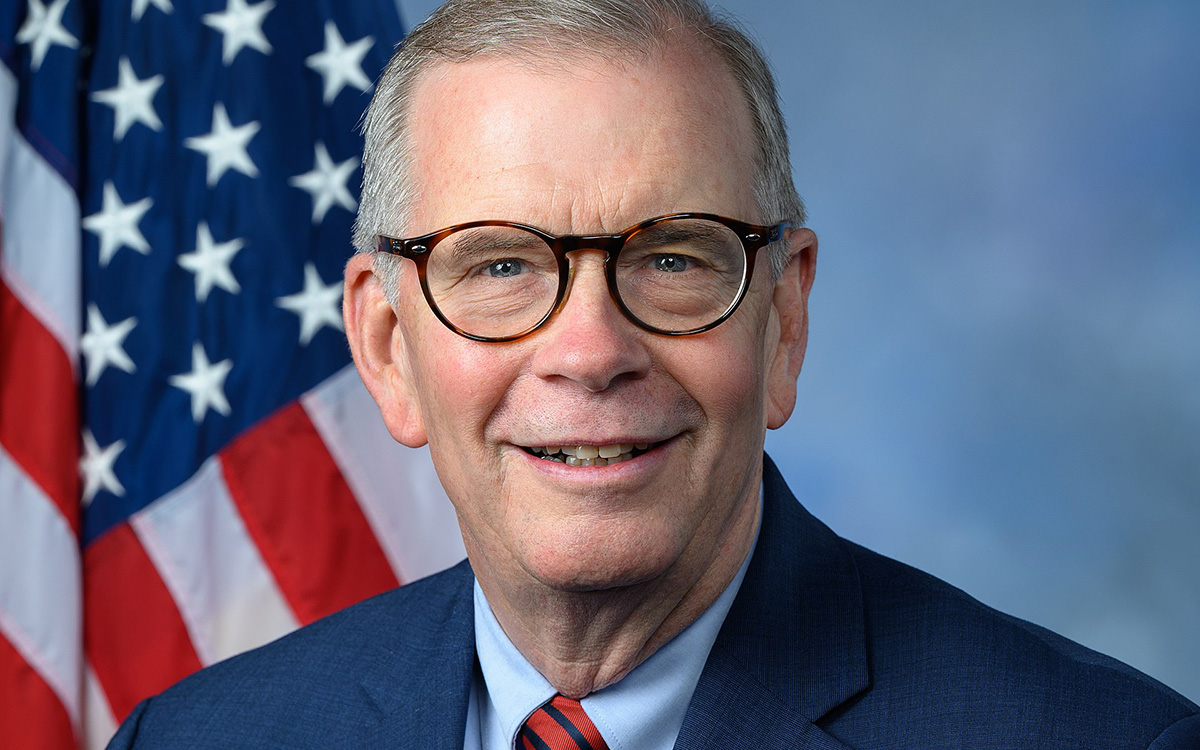Congress
House ethics complaint filed over GOP staffer’s anti-trans email
Rep. Carol Miller’s chief of staff defended his actions

A federal government employee has filed a complaint to the U.S. House Ethics Committee over an email they received from Matthew Donnellan, chief of staff to Republican U.S. Rep. Carol Miller (W.Va.), which contained combative and anti-trans language.
The Washington Blade has seen the correspondence between the parties, in which the confrontation was apparently kicked off when the congresswoman’s top aide received an email that included the sender’s preferred pronouns in the signature box, triggering his reply.
Donnellan wrote, “As a father, it is disgusting that anyone would ever tell my son or daughter that something is wrong with them and they should take sterilizing hormones or have surgery to cut off their genitals.”
“The fact that you support that ideology by putting pronouns in your signature is awful,” he said, adding, “You’re disgusting and should be ashamed of yourself. Don’t email me or anyone from my office ever again.”
A senior government official told the Blade in a written statement that the email was not out of character for Donnellan:
“I’ve heard from two colleagues several months apart about two separate transphobic emails, using identical language, from Matthew. Unfortunately these emails—though inconsistent with the typical collegiality one would expect from a Chief of Staff on the Hill—is likely a reflection of both increased partisanship on the Hill and a rise in anti-LGBTQ rhetoric from the right.
“Not only is this virtual, hate-filled temper tantrum unbecoming of a Chief of Staff, inappropriate, and unprofessional, it also hurts his boss’s constituents. DC is built on congressional staff, members of Congress, and executive officials being able to put aside their differences to find unlikely areas of commonality where they can work together.
“Even some of the most progressive members, like [U.S. Reps. Alexandria Ocasio-Cortez (N.Y.) and Jerry Nadler (N.Y.)] have partnered with some of the most conservative members, like [U.S. Reps. Matt Gaetz (Fla.) and Jim Jordan (Ohio)], respectively, when they can find common ground.
“Matthew’s refusal to work with an agency department or office just because a staffer has pronouns in their signature isn’t just hateful—it means he’s cutting off opportunities to deliver results for his boss’s constituents, especially in a divided Washington.”
Donnellan told the Blade by email that his response to the government employee is “a reply I send to anyone who uses pronouns or pushes gender ideology in any way.”
“No one is ‘born in the wrong body’ and it’s horrific to tell anyone that they need genital mutilation surgery or sterilizing drugs,” he said. “People who push gender ideology, actively or passively, are awful and should be confronted every single time.”
“If the blunt reality of the terrible things that they are pushing is offensive to them then they should strongly reconsider what it this they believe and the harm that they are doing rather than simply trying to conform to liberal luxury beliefs,” Donnellan said.
Addressing the complaint filed against him, Donnellan said, “I haven’t heard anything from Ethics and doubt that I will, they generally don’t waste their time with sheltered progressives being forced into the real world for the first time.”
A House Ethics Committee spokesperson declined to comment when asked if they could confirm receipt of the complaint.
Asked whether Miller might object to the way that she and her Congressional office are represented with these confrontational email exchanges, Donnellan said his boss’s “motto is ‘cut the bull’, and gender ideology is some of the biggest bull there is.”
On Friday, the congresswoman’s son Chris Miller placed third in the Republican primary contest for West Virginia’s gubernatorial race, where the state’s Attorney General Patrick Morrissey secured his party’s nomination in a decisive victory with 33 percent of the vote.
Leading up to the election, trans issues had emerged as a dominant focal point as the GOP candidates squared off against each other, with Miller’s campaign attacking Morrissey with allegations that he had profited from “the trans agenda” and backed a drug company that “helps turn boys into girls” when working as a healthcare lobbyist in Washington.
In one ad that was paid for by a super PAC chaired by his father, Miller said the pronouns used by Morrissey are “money-grubbing liberal,” an interesting charge to level at the conservative Republican attorney general of West Virginia (even notwithstanding the fact that those three words are not pronouns but, rather, nouns and verbs.)
Declaring preferred pronouns in workplace email signatures has become commonplace in both the public and private sector, whether for purposes of sending an affirming message to transgender and gender expansive employees and officers or to mitigate the chances that either they or their cisgender counterparts might be unintentionally misgendered.
The Biden-Harris administration has pushed for agencies to adopt the practice along with other measures and policies to advance the rights and wellbeing of trans and gender expansive employees across the federal government.
In a 2021 announcement of the U.S. Department of Agriculture’s issuance of updated guidance on the agency’s email signature block, Michael Watts, director of civil rights for the U.S. Forrest Service, noted that “There are plenty of gender-neutral names out there, or names from other cultures that might not give you enough information to know their gender.”
While the inclusion of pronouns was not made mandatory at USDA, he urged employees to “strongly consider taking this small but important step toward supporting inclusiveness in the workplace.”
“The use of pronouns in our email signatures and getting into the habit of including pronouns in our introductions doesn’t really cost us anything,” Watts added, arguing that the move constitutes “a meaningful exchange to others and makes it easier for people to be respectful in how they address each other.”
“I just think it’s the right thing to do,” he said.
Official guidance published by the U.S. Office of Personnel Management, which is responsible for administering policies across the U.S. federal civil service, stipulates that agencies should “take steps to provide the option for employees to include the pronouns they use in employee systems and profiles, including email signature blocks, employee directories and employee profiles.”
Some have gone further, such as by adding pronouns to email signatures for all employees, as the U.S. Department of State did in 2023, while others like USDA have established, as official policy, that “employees are encouraged to include their pronouns in the first line of their email signature block (e.g. he/him/his). Signature blocks are a simple and effective way for individuals to communicate their identified pronouns to colleagues, stakeholders, and customers.”
“For example,” the USDA writes, “adding pronouns to signature blocks also has the benefit of indicating to the recipient that you will respect their gender identity and choice of pronouns.”
Congress
House Republicans advance two anti-trans education bills
Congresswoman Jahana Hayes, LGBTQ groups slammed the effort

Republicans members of the House Education and Workforce Committee advanced two anti-transgender bills on Wednesday, one that would forcibly out students in public elementary and middle schools to their parents and a second covering grades K-12 that critics have dubbed a “don’t say trans” bill.
More specifically, under the PROTECT Kids Act, changes to “a minor’s gender markers, pronouns, or preferred name on any school form or sex-based accommodations, including locker rooms or bathrooms” could not be made without parental consent, while the Say No to Indoctrination Act would prohibit schools from teaching or advancing “gender ideology” as defined by President Donald Trump’s anti-trans Jan. 20 executive order, Defending Women from Gender Ideology Extremism and Restoring Biological Truth to the Federal Government.
U.S. Rep. Jahana Hayes (D-Conn.), who was named national teacher of the year before her election to Congress, rose to speak out against the bills during the committee’s convening on Wednesday.
“Curriculum does not include teaching students to be something else. Curriculum does not include indoctrinating students to identify as gay or LGBTQ or other or anything. But federal law mandates that all students have civil rights protections,” she said.
The congresswoman continued, “I don’t really understand what the members of this committee think happens in schools, but my question is, what do we do with these children? The children who you are saying, on this committee, don’t exist, the children who are struggling with their identity and often times confide in their teachers and ask for support and help.”
“What we’re doing in this committee is focusing on a small population of students who are at a point in their life where they are struggling and school may, for many of them, feel like the only safe place or the only place where they can get support, or the only place where they can speak to a counselor,” Hayes said.
“And as a teacher, I don’t care if it was just one student that I had to reassure that they were important and they were valued and they belonged here,” she said. “I’m going to do it, and anyone who has dedicated their life to this profession will do the same. So the idea that you all feel okay with arbitrarily erasing, disappearing people, making them think that they they don’t exist, or they don’t have a place in schools, or the curriculum should not include them, or whatever they’re feeling should not be valued, considered, Incorporated, is just wrong.”
“So I will not be supporting this piece of legislation, as if that was not already evident, and I will be using all of my time, my agency, my energy, my advocacy, to ensure that every student,” Hayes said, “feels valued, respected, important and included in the work that I engage in on this committee.”
The congresswoman concluded, “when you are in a classroom and you are a teacher, and that door closes and a student falls in your arms and says to you, I am struggling, and I can’t go home with this information, and I need Help, you have a moral responsibility to help that child or you are in the wrong profession. I yield back.”
The Congressional Equality Caucus slammed the bills in an emailed statement from the chair, U.S. Rep. Mark Takano (D-Calif.), who noted that the legislation comes as “Donald Trump is illegally trying to dismantle the Department of Education and pass tax cuts for billionaires.”
“Extreme Republicans in Congress are trying to distract Americans by advancing cruel, anti-trans legislation,” said the congressman, who is gay. “School districts, teachers, and staff best understand how to draft age-appropriate, inclusive curriculums and craft policies that both respect the important role parents play in children’s education and the importance of students’ safety.”
“Yet, Republicans’ Don’t Say Trans Act would cut critical funding for schools if their teachers teach lessons or include materials that simply acknowledge the reality of trans peoples’ existence,” Takano added. “Republicans’ forced outing bill would put kids in danger by requiring schools that want to take certain steps to affirm a transgender student’s identity to forcibly out them to their parents — even if the school knows this will put the student’s safety at risk.”
The caucus also slammed the bills in a series of posts on X.
🚨BAD BILLS ALERT🚨
— Congressional Equality Caucus (@EqualityCaucus) April 9, 2025
Today, the GOP-controlled Education Committee is voting on two anti-trans bills: One to force teachers to out trans students if they want to take certain steps to affirm the students’ identities, and a “Don’t Say Trans” bill.
Here's why we’re opposed: 🧵
The Human Rights Campaign also issued a statement on Wednesday by the organization’s communications director, Laurel Powell:
“Instead of putting our dangerous President in check and tackling the American economy’s free fall, House Republicans showed where their priorities lie — giving airtime to junk science and trying to pass more anti-LGBTQ+ legislation.
“Forcing teachers to ‘out’ trans youth rather than supporting them in coming out to their families and demanding that schools ignore the trans students who sit in their classrooms is a craven attempt to distract people from economic disaster by vilifying children.
“Even as they fire people whose jobs were to make sure schools have the resources they need, the Trump administration and their allies in Congress continue to attack vulnerable young people to score points with the far right.”
Congress
Chris Pappas launches Senate bid in N.H.
Video references ‘political extremists who want to take rights away’

Gay U.S. Rep. Chris Pappas (D-N.H.) launched his bid for the seat held by retiring U.S. Sen. Jeanne Shaheen (D-N.H.) with a video posted to X Thursday morning and kickoff event planned for the evening in his hometown of Manchester, N.H.
“I’m running for Senate because our economy, our democracy, and our way of life are on the line, and New Hampshire deserves a senator who is grounded in the people, places, and values of this state,” he said in a press release. “Granite Staters know my record of taking on the big fights and looking out for them — pushing tax cuts for working families and small businesses, taking on predatory companies and corporate polluters, and standing up to Big Pharma to lower drug costs.”
Pappas’s statement continued, “Like Sen. Shaheen, I’ll always put New Hampshire first. You can count on me to lead the charge to confront this administration, self-dealing billionaires, and extreme politicians who threaten our future and our ability to get things done for New Hampshire.”
In his video, the fourth-term congressman pledged to rein in the power of big corporations, and he addressed “veterans, parents, small business owners,” and the “people who have done everything right” but are “asking ‘why does it feel like the system is rigged?'”
Referencing concerns with the Republican administration and GOP majorities in Congress, he said, “You think about the social security office that’s gonna be closed in Littleton, drastic cuts to Medicaid, all in the name of giving big tax breaks to billionaires like Elon Musk.”
Pappas also seemed to allude to anti-LGBTQ moves by the White House and congressional Republicans, promising to stand up to “political extremists who want to take rights away.” The ad wrapped with a shot of the congressman with his husband Vann Bentley. “We will get our country back on track. Stronger, fairer, freer, working for everyone.”
I’m in.
— Chris Pappas (@ChrisPappasNH) April 3, 2025
Today I’m announcing my campaign for U.S. Senate because New Hampshire needs a fighter who gets things done.
Let’s do this. pic.twitter.com/bAyE5u4LSk
Freshman U.S. Rep. Maggie Goodlander (D-N.H.) is also considering a run for Shaheen’s seat while former U.S. Sen. Scott Brown (R-Mass.) and former New Hampshire Gov. Chris Sununu are mulling campaigns.
Pappas was endorsed by the LGBTQ Victory Fund, whose newly seated CEO Evan Low released a statement:
“Rep. Chris Pappas has a long and storied history of serving New Hampshire, and LGBTQ+ Victory Fund has been right by his side since he ran for state office 23 years ago. He has a track record of taking on big fights for his constituents and has proven that he can win tough races, outperform expectations, and flip key Granite State seats. Whether its strengthening the economy, protecting bodily autonomy or taking on price gougers, Chris will continue to be an important voice that looks out for the people of New Hampshire.
“We need Chris’s pro-equality voice in the Senate, where right now we only have one LGBTQ+ member. He will be a strong fighter against anti-equality forces in the current administration and extreme politicians looking to erase our rights and existence.
“His presence in the Senate will be critical to retake the majority and ensure that Granite State voters won’t get a raw deal. Chris deeply understands New Hampshire, and his record shows that he is laser-focused on getting things done. We are thrilled to endorse Chris Pappas for a history-making place as the first out LGBTQ+ man to serve in the Senate.”
Congress
Chris Pappas reportedly planning run for US Senate
Gay N.H. lawmaker has not officially announced bid

Gay U.S. Rep. Chris Pappas (D-N.H.) has told colleagues he plans to run for New Hampshire’s open U.S. Senate seat, to succeed retiring Democratic U.S. Sen. Jeanne Shaheen, according to a report in Axios on Thursday.
“I haven’t come to a decision yet,” he said during a town hall over the weekend. “But I know these times are incredibly perilous, and this is a time where we need the kind of leadership that Sen. Shaheen has demonstrated, which is about putting the needs of New Hampshire first.”
Axios also reported that fellow Democratic U.S. Rep. Maggie Goodlander, who represents the Granite State’s 2nd Congressional District and previously served as deputy assistant attorney general in the Justice Department’s Antitrust Division, is considering a run.
Hundreds of constituents attended recent town halls hosted by Pappas and Goodlander.
While Pappas’s voting record positions him as among the most centrist and bipartisan of the House Democrats, the National Republican Senatorial Committee has sought to portray the lawmaker as a far-left ideologue in a new oppo website.
If he runs and is elected to succeed Shaheen, Pappas would be one of two openly LGBTQ U.S. senators, alongside Tammy Baldwin (D-Wis.).
-

 Opinions5 days ago
Opinions5 days agoIt’s time for new leadership on the Maryland LGBTQIA+ Commission
-

 The White House4 days ago
The White House4 days agoWhite House does not ‘respond’ to reporters’ requests with pronouns included
-

 Arts & Entertainment5 days ago
Arts & Entertainment5 days ago‘Gay is Good’ Pride Pils Can Celebrates Frank Kameny’s 100th Birthday for WorldPride in D.C.
-

 Sponsored5 days ago
Sponsored5 days agoTHC Drinks: What You Should Know About Cannabis Beverages









